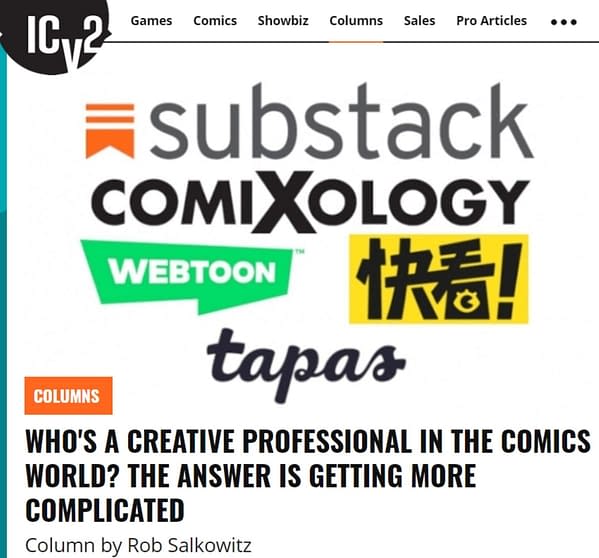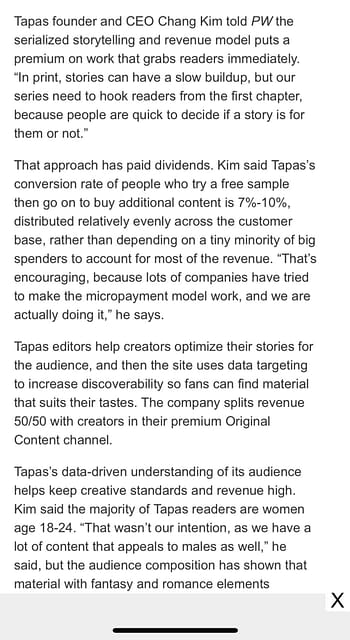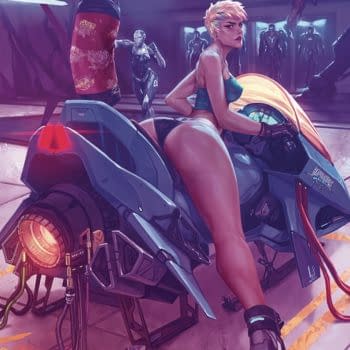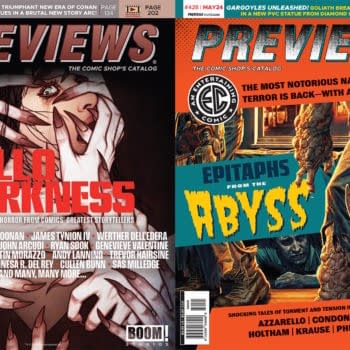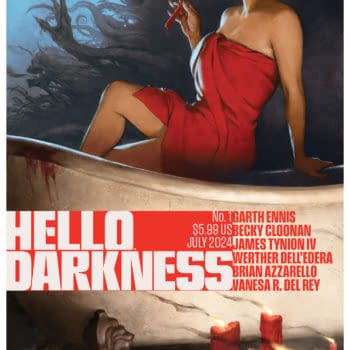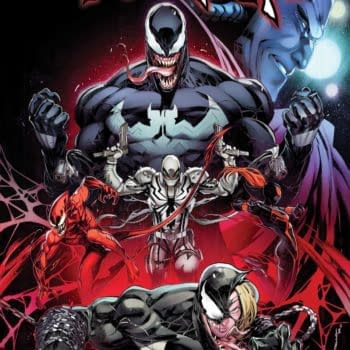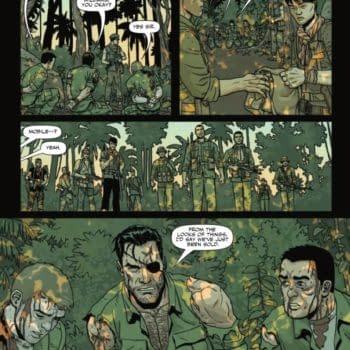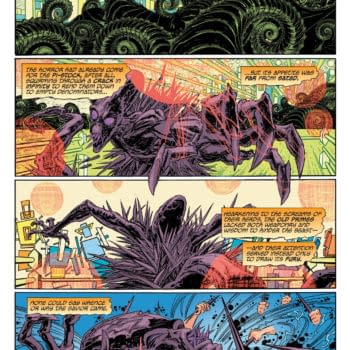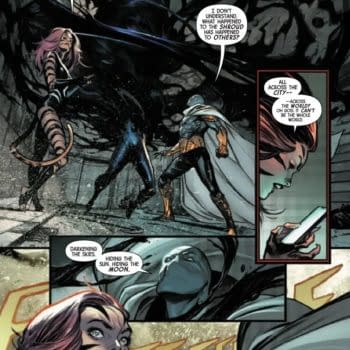Posted in: Comics | Tagged: icv2, tapas, webcomics, Webtoon
Fanboy Rampage: Webtoon Comic Creators – Amateur Or Professional?
Rob Salkowitz, author of Comic-Con and the Business of Pop Culture, wrote an article for comic book retailer site ICV2 last week on webtoon comic creation, looking at comic book industry moves into digital and specifically mobile digital in the comic book industry, including DC's deal with Webtoon and Tapas' hiring former DC Comics editorial staff. Promoting the article he tweeted "New platforms blur the line between comic professionals and aspiring amateurs, changing the publishing landscape" with the article saying "some saw it as just trading down the DC brand by mingling the material with a lot of substandard fan-created content that's prevalent on mobile subscription-based comics platforms. That last point is crucial because it touches on one of the hot button issues in the industry, the well-policed line between professional and amateur. Technically, a professional is anyone who gets paid for doing what they do, so even low-earning webtooners qualify, same as the aspiring artist who gets $50 for a story in a small press zine. Still, there was, until recently, a pretty clear demarcation between work produced to the standards of Marvel and DC, and the stuff you could find on a Tumblr page or self-published material peddled at an artist alley table. Webtoon and their cohort have made a business blurring that line. Yes, some of the site's top content gets paid readership far, far beyond anything that traditional comics could aspire to, but those superstar performers are at the peak of a steep power curve with a very long tail. Upwards of 80% of material appearing on these sites is the work of fans, amateurs, or very early-career professionals. Some of it is good, some of it gets good after a while, and some of it needs work. If you're expecting consistent standards of excellence, you are obviously looking in the wrong place, and because of that, the polished professional work that does appear on those sites can seem like the ritzy couple in evening dress lined up for a $1 pizza slice."
While intended for the comic book retailer audience, published online it soon spread further, and many comic book creators, both in print and in digital, weren't entirely sure that this was a valid take and said so. And Rob interacted with them, as he realised that the audience for the piece was suddenly a lot wider than the intended one. Here is just a smattering of some of the response on Twitter alone.
- Hamish Steele: Say you haven't read a webcomic without saying you haven't read a webcomic
- Trevor Mueller: Hey Rob, I'm a creator who has done direct market, self-publishing, free webcomics, and has two webtoon originals coming out next year. I've also explored literary GNs. Happy to connect next time you write an article like this to help shed some light and address any inaccuracies. Feel free to use me as a reference when writing articles like this. Happy to share knowledge and help inform your readers, and make sure all the information within is correct.
- Miguel Guerra: Want to see what I'm up in terms of my art drop by webtoon and read my adaptation of Edgar Allen Poe's The Black Cat. Or as ICV2 called it "substandard"
- Fulcagay: That article only shows your lack of understanding of webcomics, the webcomic media in general and the platforms you show. Do you really think webcomic creators have an AI or something like to tells us how readers react to each panel? In what kind of sci-fi world do you live?
- Rob Salkowitz: No, I think the platforms have that because they have said so.
- Fulcagay: I am a professional freelance webcomic author on Webtoon and Tapas, they do not have that data of "knowing how they react on each panel". At the most, we can know how many likes, comments, and views they have, like in any other social media. Can you tell me where do they say it?
- Rob Salkowitz Here is a piece I did on Tapas in January based on a long interview with their CEO. They elaborate on their business model in some depth here. Tapas Sees Big Gains for Digital Comics
- Fulcagay: Read the whole article and yet I'm still waiting for the piece of media where it says that we have an AI that tells creators how readers react if each panel. Idk, it seems that you made things up because you're mad that the superhero DC stories are not as relevant as before, Rob.
- Deya Muniz: nowhere in this article did you mention AI or that tapas has any kind of demographic data print comics don't also usually have. Where did you get the panel by panel optimization from? is it ONE online platform that has that and you extrapolated it to mean all of them??
- Rob Salkowitz: Also talked to Webtoon and Stela (RIP), and Kuaikan mentioned its AI in its press release. I do some work in tech. The granularity of the metrics is astounding. Covers For A Mobile Generation.
- Deya Muniz: so you took the AI bit from a press release from ONE platform and extrapolated it to mean all webcomic platforms must have it? No mention of AI on this article either, and I know EXACTLY what metrics Webtoon creators have on both the canvas and original sides of the platform
- Rob Salkowitz: I appreciate you acknowledge the difference in my approach writing for different audiences. ICV2 caters to the old guard of comics retail, and I was straw-manning an old guard argument (badly, obviously) in that section so they will keep reading. I have heard some of these old comics retail people refer to Scholastic as an "Indy" publisher for example, even though Scholastic outsells DC + Marvel by 10x.
- Deya Muniz: and when they are wrong what do you chose to do? agree with them so they keep reading or educate them on the reality of the matter? if your goal was the latter you failed miserably and offended many webcomic professionals on your way
- Fulcagay: Rob is mad because webcomics are more relevant than yet another comic of the same superhero made by 15 different people with no personal touch on them, so he just spread lies and misinformation so people like him can still think webcomics are only for kids and women. Grow up.
- Rob Salkowitz: Good barking, wrong tree. I am delighted a new generation and new demographic is into comics. Not everyone has to like what I like and vice versa. I am trying, in my obviously flawed way, to bring that message to the traditional industry.
- Kayla Fussell: "not everyone has to like what I like, but I will call the things I don't like amateur and substandard"
- Rob Salkowitz: You can if you want. And again, "amateur" means "does not get paid, does not make a living" from an activity. It is not a judgment of quality; lots of amateur work is great just as much work by paid professionals is garbage incidentally produced to a consistent standard.
- Fulcagay: Oh yes, here you are, not judging the quality of the ones you called "amateur" – "That last point is crucial because it touches on one of the hot button issues in the industry, the well-policed line between professional and amateur. Technically, a professional is anyone who gets paid for doing what they do, so even low-earning webtooners qualify, same as the aspiring artist who gets $50 for a story in a small press zine. Still, there was, until recently, a pretty clear demarcation between work produced to the standards of Marvel and DC, and the stuff you could find on a Tumblr page or self-published material peddled at an artist alley table"
- Rob Salkowitz: Again, I understand why this hits the wrong notes with webtoon creators and I apologize. You were not the audience for this piece and this publication. Like it or not, on the other side of the biz, the perception of a hard pro/non-pro boundary exists. I'm saying it shouldn't
- Deya Muniz: no, you framed this boundary as useful and correct throughout and then said "i guess it's not all bad cause there'll be more of an audience for comics and the actually good webcomics might go to print and then retailers can profit"
- Fulcagay: So you're saying that we, internet webcomic artists, are not the audience of an article about webcomic artists posted in the internet? You're literally saying "I'm sorry, you shouldn't have heard the insult I just said to your face, so it's also your fault for being mad at me"
- Rob Salkowitz: No, you are right to take offense. The context is, it's a specialty site that caters to a particular audience. When I write about webcomics for Forbes or PW, my angle is different because the editorial expectations are different. I'm here engaging because I respect the criticism
- Fulcagay: What's your goal in here, Rob? You insulted us, diminished women and kids-focused stories, spread misinformation about the websites, shared the article over Twitter. The least you could do is publicly apologize to webcomic artists and delete the article
- Rob Salkowitz: The response on this last piece was mixed, to say the least. I'll live with that. Everyone can always get better, can listen more, myself included. I did not intend disrespect to creators at any level. Creation is good, fans are good, no matter who they are. Peace.
- Kayla Fussell: Ok but like, bare minimum are you going to apologize for the miss information?
- Rob Salkowitz: I always want to correct errors of fact. What are you referring to? The nature of the site metrics? I may have misinterpreted what the sites & execs said, but I did not make that up. I've had lots of convos with people on the platform side.
- Kayla Fussell: I am referring to these two authors who you never answered their question. You threw another article at them that didn't answer their question
- Rob Salkowitz: Yes, sorry, I write a lot about this topic and various bits come out in different stories. Bottom line is that every platform uses very granular performance metrics because webcomics need to hook readers in 3-4 episodes. Whether that bubbles through to creators, I don't know.
- Deya Muniz: if you didn't know why did you write that our editors make us change our stories according to the granular data? cause they don't.
- Rob Salkowitz: What I was told is that editors share with creators things that are working, based on whatever insights are available. That may be true in general but not in every case; every editor-creator relationship is a little different. Either way, it helps discoverability for new readers.
- Deya Muniz: there was a very clear implication in your writing that webcomics use & apply readership data to a higher and more detailed extent than print and that's not true. Print serialized comics have to hook readers within the first issue just like webcomics with their first eps
- Rob Salkowitz: From the PW piece in January
- Chelsea Goerzen: I think you misunderstand – this is not the "granular detail of how people are reacting panel by panel" that you claim exists in your article, this is 'comics like this get more views, and from this audience, we can tell our editors that this works.'
- Deya Muniz: (which again, print comics has access to similar metrics regarding what sells……)
- Rob Salkowitz: I talk to a lot of print publishers. They would kill for 1% of the quality metrics available to digital…. Bottom line, while I disagree with some of your specific characterizations, it is absolutely true that I use different styles and approaches for different outlets. ICv2 pays me to be a columnist, which means I need a strong, strident point of view, and I'm talking to a trade audience with their own views and jargon. If I want to connect with them, I have to start on common ground and move them off it slowly. For Forbes and PW, I write straight business news. My discretion is in what I cover. Let me ask you, how many news stories do you see about webcomics on Forbes? Probably all of them are by me, because I think it's an important story. Across all these platforms, my position is this: the comics industry is changing, the audience is changing, and a lot of the new successful models don't look like what the old business is used to. For general business readers (Forbes, etc), I point to the large piles of money being invested in the new models. Obviously someone thinks this is the future of comics enough to dump billions of dollars into these companies, and that's great. For PW, which is very tuned in to the changing audience for comics, I write about how webcomics are creating a new channel for the same readers who buy/borrow kids, middle grade and YA graphic novels, and bringing new voices into the medium. For ICV2, though many readers are very progressive and tuned in to the same ideas, they are institutionally invested in traditional models. Change can be seen as a threat, even when it's really an opportunity. I see my job as trying to explain that using an "inside voice". In this last piece, I was "ventrilogquizing" a perspective I hear a lot from some old-fashioned retailers and pros with respect to the webtoon space, as a starting point for why that's not the right way to look at the business. Obviously it landed the wrong way outside of its core audience. What can I say? Am I ignorant? Am I an asshole? I try not to be, but sometimes I hit the wrong note, and Twitter always isn't the best place to find peace, love and understanding. If this still isn't a satisfactory explanation, what can I say? Can't please everyone. Anyway, I've got some other stuff to do today so I'm gonna move on. Thanks for the conversation.
- Koniicha: Webcomic authors don't make their own scripts, storyboards, pencils, ink, color, lettering EVERY WEEK to be called "amateurs and garage bands", guess the other side of the industry is angry or scared, but that doesn't give them the right to treat other authors like this.
- Rob Salkowitz: Not intended as pejorative. UGC creators who do not get paid are, by definition, amateurs, and the fact is many/most don't make a living with their comics (yet). Whether you prefer garage bands to major acts (I tend to, YMMV) is a matter of taste.
- LySandra Vuong: what on earth are you talking about? why don't you properly compare PUBLISHED titles instead of comparing clearly UNPAID WORK to PAID WORK. MAKE IT MAKE SENSE
- Rob Salkowitz: The top titles on webtoon platforms are every bit as professional as those going through traditional publishing, & some are MUCH more popular in terms of readership. But webtoon platforms also publish a lot of UGC – it's part of their business model. That's what I'm talking about
- LySandra Vuong: if you knew anything about what actually happens at webtoon UGC is hardly a drop in the water of their business model and therefore irrelevant to the conversation which you are centering around comparing webtoon published content and dc/marvel published content
- Rob Salkowitz: Perhaps you're right. I have interviewed the people who run and manage the platforms and they have told me that even though UGC is not revenue-producing, and I've reported that. But maybe from the creator perspective it's different. (sorry, left something out) – not revenue-producing but STILL CRITICAL to their audience development and content strategy. Both Webtoon and Tapas say this.
- Austen Marie: Where do you think the 'paid professional' work comes from? majority of the time it started as UGC. Of course UGC matters to the platform, like every popular platform UGC keeps it running, like twitter, tiktok, youtube, twitch, etc?
- Rob Salkowitz: That is actually my point. Really we are in violent agreement here
- Claire Napier: The perspective of this article is cartwheeling my mind bc this is framed as how webtoon is DIFFERENT from direct market monthlies. It's funny because from my perspective, it's absolutely easy peasy simple pimple to only ever read excellent, award-level comics on webtoon by beginning from the front page of the app. Scrappier ones are harder to find, no? As an entry-level experience "opening webtoon" is 1000000 easier than "entering comic shop & divining with your mind powers which 20 pages will be good via their potentially/probably misleading cover" I am sorry, in one way, to say. Not to mention the extra level of "oh, duh, that's what I'll like" if you follow their social media. I don't know if this is better than e.g. DC's social media bc I don't care to look at it, but if someone else has reviewed that experience please link me. But even putting that aside, webtoon containing "amateur" comics is exactly the same as your local shop or your favourite convention-carrying indies. Isn't it?
- Jeff Martin: Folks who wrote that article are telling on themselves. Webtoon's most popular stuff makes Marvel and DC's audience numbers look like the kids table, and so do a bunch of the "amateur" comics on Canvas.
- Evan starteas: Entitled people who have the gall to say webcomics aren't real comics: I did not spend 3 years over 100 pages or thumbnailing, coloring, text formatting for you to tell me that my comic isn't considered "real". Get out of here with that crap. I don't even want to tell you how much I pushed myself to get an update out EVERY WEEK, TWICE A WEEK for 3 years!! And my comic STILL isn't done! Calling webcomic artists amateurs is such a disservice to the hard work they put in whether it be WEBTOON, TAPAS, etc. My comic is not lesser than because it's not published by Marvel or DC. I put a damn good amount of work into it and I'm proud of myself for making it. The same goes for any other creator.
- Fabian Nicieza: I don't know who wrote that "article." I only know they're about 80% imbecile.
- Trevor Mueller: This article has a very outdated definition of "professional," trying to value and legitimize direct market only – but that's not where the growth is right now. It doesn't even mention literary GNs or manga. Webtoons has the growth, numbers, and awards. What more does it need?
- GRAVEWEAVER: I find this strange because Marvel and DC has often hired these artists with tumblr pages and artist alley tables. Why is their work only finally considered professional when they passed the line to creating work for an Old Dude IP™? Yes, my webtoon hit 100 million views a few months ago, its probably closer to 125 million now. I also have merch in retail stores, and I promise I make more than DC or marvel would ever pay me. Of course, I'm barely a professional, so let's not get ahead of ourselves… being professional is when you hate your job… Editors at WEBTOON help the creator make the best version of THEIR story, they do NOT push creators into corners that appeal to metrics. If there is a successful story on WEBTOON, its because the genuine heart and idea of a creator's work is appealing to the masses. An editor may make suggestions, but at the end of the day, the creator says what goes. I have always liked WEBTOON for this. The article puts a lot of emphasis on art quality. Yes, WEBTOON will have lower art quality than a typical comic book. Some of us just like being alive and intentionally take a lot of shortcuts for a healthy work/life balance…
We look forward to the inevitable sequel article taking in all these comments as well. Fanboy Rampage was a blog by Graeme "Graham" McMillan dedicated to comic book back-and-forths online. McMillan has moved on now, becoming a proper journalist for the likes of The Hollywood Reporter and Wired but he gave permission to Bleeding Cool to revive his great creation.


